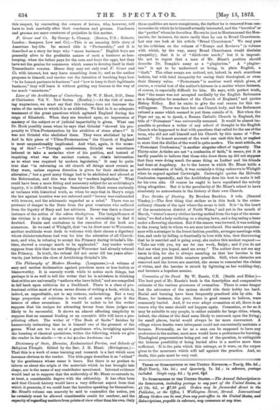Lives of the Archbishops of Canterbury. By W. F. Hook,
D.D., Dean of Chichester. VoL V. New Series. (Bentley.)—At the risk of seem- ing ungracious, we must say that this volume does not increase the nine of the series to which it is an addition. We find in it no adequate treatment of the greet questions which agitated England during the reign of Elizabeth. When they are touched upon, no impression of mastery of the subject or of judicial impartiality is given. Whet can Dr. Hook possibly mean when he says that Grindal "showed his pro- pensity to Ultra-Protestantism by his abolition of stone altars?" It was not Grindal who abolished them. They were abolished by law. And in this piece of " Ultra-Protestantism " the Church of England is most unquestionably implicated. And what, again, is the mean- ing of ,this? — " Through carelessness, Grindal was sometimes induced to take a sectarian view of his position, and instead of inquiring what was the ancient custom, to obtain information as to what was required by modern legislation." It may be quite true that "in reforming an Old church all things must remain as they were, unless express direction is given for their abolition or alteration ;" but a good many things had to be abolished and altered at the Reformation, and this was done by "modern legislation." What could have been a more fitting and necessary subject for an archbishop's inquiry, it is difficult to imagine. Sometimes Dr. Hook seems curiously at variance with historical truth, as when he says that in Mary's reign the law against heretics was not enforced until "heresy was confounded with treason, and the schismatic regarded as a rebel." There was no pretence of danger to the State from the poor creatures who suffered from the bigotry of Mary and her advisers. Never was there a clearer instance of the action of the odium theologicum. The insignificance of the victims is a thing so notorious that it is astonishing to find it doubted. Faults and confusions in the execution of the book are numerous. So we reed of Whitgift, that "as he drew near to Worcester, another multitude went forth to welcome with their cheers a dignitary whose disinterestedness had won for him the adoration of all Church- men, and who, in refusing to accept the Primacy during Grinders life- time, showed a courage much to be applauded." Any reader would suppose from this that the new Bishop of Worcester had already refused the Primacy. In truth, the refusal did not occur till ten years after- wards, just before the close of Archbishop Grinders life.


































 Previous page
Previous page